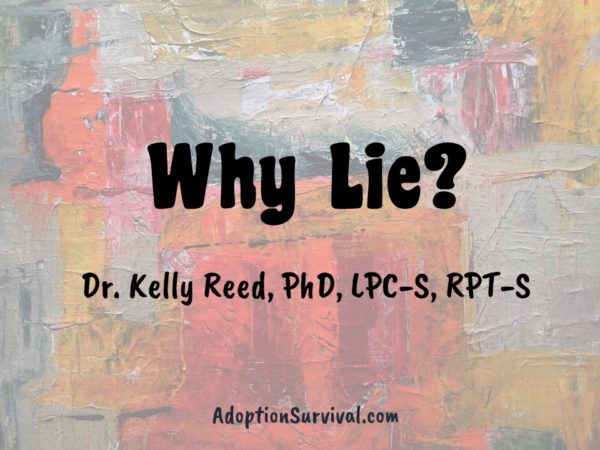
While nearly everyone lies, few understand why they do, how destructive it can be, or how to stop. Because the human imagination is limitless, no list can possibly encompass all the reasons people lie. However, Drs. Kittle and Reed have reviewed research on lying and complied a list of various reasons:
- To avoid punishment.
- To avoid shame, embarrassment, and being judged.
- To avoid conflict.
- For material gain, such as reward or sales. A child says she has done her homework, so she can go play with friends. While trying to get the best price when buying a home/car, the buyer tells the seller a certain amount is the highest they can afford. A salesperson tells you, “That fits you well” when it is too small.
- To maintain or improve self-esteem. These lies are often told by people with low self-esteem, who experience a sense of failure and inferiority. They feel insecure and often lie because they want to try to fit in, or to try to get others’ attention, interest or admiration.
- To preserve independence. Kids keep some secrets from their parents because they do not want them to know everything.
- To create a sense of identity. People may feel more comfortable in a set role or identity, so they lie in order to be seen or treated in a certain way. This reason can be either unhealthy (pathological and manipulative) or relatively healthy. Professionals (e.g., teachers, doctors, counselors, etc.) need to behave a certain way so that people seeking their services will think they are competent and successful. Lying to make oneself look good on their resume (called “resume inflation”) or during a job interview is particularly common.
- As a wish fulfillment. A child says, “We went to Disney World over the summer” because the child wanted to go to Disney World, wishes they had, and thinks if people believe we did, maybe that is good enough.
- To assist self-deception. These lies are told to avoid confronting some painful truths about ourselves. Those who struggle to take responsibility for their own actions lie to protect themselves from facing some hard truths and to avoid accepting blame. Some people blame needing to work rather than admit they do not do well at social events. Your neighbors might choose to go on vacation after you had a huge falling out and say it is because they love to travel. A thief who justifies stealing only from rich people who do not give to the poor. An alcoholic who is self-deceived in believing that his drinking is under control. A girl who convinces herself that her boyfriend loves her even though he has told her repeatedly that he wants to break up. Lying to oneself is one of the most harmful types of deception and automatically leads to lying to others.
- To obtain a sense of power. Some people experience a feeling of power from telling a lie and getting away with it. People may also lie to prove a point or to try to change someone else’s opinion because it makes them feel more powerful. The additional problem with these lies is that people can form a disconnect between reality and fantasy.
- For the amusement of fooling someone. Unlike genuine humor, the practical joke can contain a bullying component.
- To be aggressive and deliberately hurt someone.
- To control or influence the behavior of others. Some people lie to pursue their own needs and wishes and, at times, the needs and wishes of others. This form of lying is manipulation.
- To protect our own resources. Most people highly value their time, energy, and money, often feeling like they do not have enough. These lies are told to avoid doing something they do not want to do, but they do not feel comfortable admitting it. These lies may be told to protect others’ feelings, to avoid conflict, to avoid being judged, or to self-deceive, but ultimately the purpose is to protect their time, energy, and money. Saying you “have to” get off the phone with someone, when really you “want to” get off the phone.
- To protect or to please others. People like to be told what they want to hear, and this is usually determined by local culture. You say you are fine, rather than disclosing a serious illness because you do not want others to worry about you. You lie to try to hide the fact that the person you are talking to smells bad. We often lie to protect our friends’ and family’s feelings such as when we’re asked if we like a gift, haircut, outfit, writing, or a performance. Some might provide an alibi or commit perjury. Children often lie to their parents because they think telling their parents what they want to hear will make them happier than telling them they failed to live up to their parents’ expectations.
Look for tips on how to respond more effectively to lying in Dr. Reed’s blog post: “From Lying to Honesty.”


